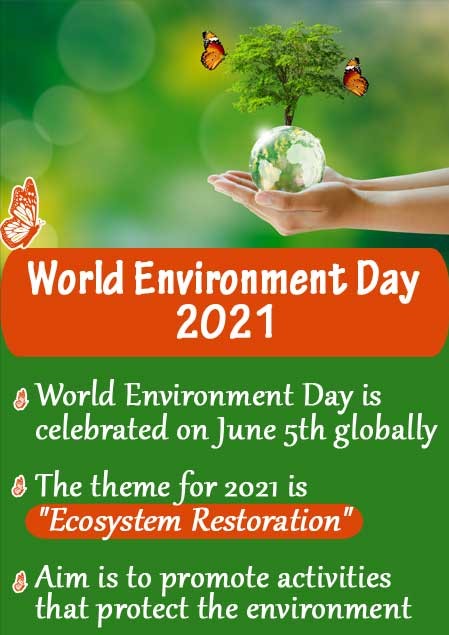World Environment Day
World Environment Day (WED) is celebrated annually on 5 June and is the United Nations’ principal vehicle for encouraging awareness and action for the protection of the environment. First held in 1974, it has been a platform for raising awareness on environmental issue such as marine pollution, human overpopulation, global warming, sustainable consumption and wildlife crime. World Environment Day is a global platform for public outreach, with participation from over 143 countries annually. Each year, the program has provided a theme and forum for businesses, non government organizations, communities, governments and celebrities to advocate environmental causes. The theme for World Environment Day 2021 is ‘Ecosystem Restoration’. This World Environment Day will kick off the UN Decade on Ecosystem Restoration (2021-2030), a global mission to revive billions of hectares, from forests to farmlands, from the top of mountains to the depth of the sea. The natural environment or natural world encompasses all living and non-living things occurring naturally, meaning in this case not artificial. The term is most often applied to the Earth or some parts of Earth. This environment encompasses the interaction of all living species, climate, weather and natural resources that affect human survival and economic activity.
- Conservation of resources by using fewer virgin materials.
- Reduction in waste through reuse and recycling.
- Using recycled material in new products.
- Reduction in energy use yields less pollution, including gases that contribute to climate change.
- Reduction of toxic chemicals into the environment.
Environmental Pollution
Environmental pollution is not a new phenomenon, yet it remains the world’s greatest problem facing humanity, and the leading environmental causes of morbidity and mortality. Man’s activities through urbanization, industrialization, mining, and exploration are at the forefront of global environmental pollution. Both developed and developing nations share this burden together, though awareness and stricter laws in developed countries have contributed to a larger extent in protecting their environment. Despite the global attention towards pollution, the impact is still being felt due to its severe long-term consequences. This chapter examines the types of pollution—air, water, and soil; the causes and effects of pollution; and proffers solutions in combating pollution for sustainable environment and health.
Environmental Protection
Environmental protection is the practice of protecting the natural environment by individuals, organizations and governments. Its objectives are to conserve natural resources and the existing natural environment and, where possible, to repair damage and reverse trends. Due to the pressures of overconsumption, population growth and technology, the biophysical environment is being degraded, sometimes permanently. This has been recognized, and governments have begun placing restraints on activities that cause environmental degradation. Since the 1960s, environmental movements have created more awareness of the multiple environmental problems. There is disagreement on the extent of the environmental impact of human activity, so protection measures are occasionally debated.


